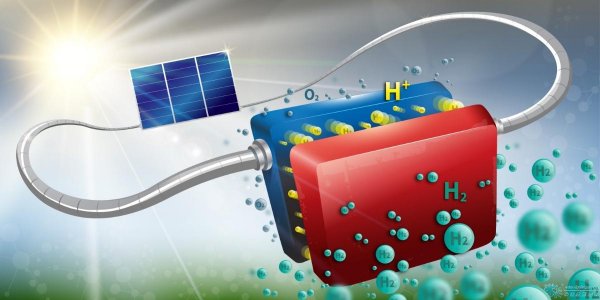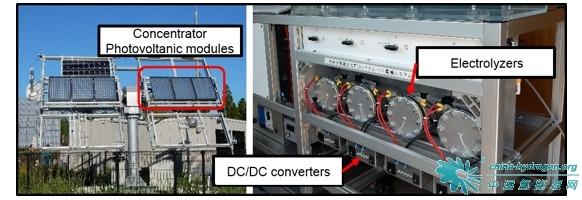Japan develops the most efficient hydrogen production from solar power
According to foreign media reports, Miyazaki University in Tokyo, the University of Tokyo, Fujitsu Laboratories and Sumitomo Electric Co., Ltd. cooperated to use solar energy to produce hydrogen in Miyazaki through experiments.
The researchers used a highly efficient concentrating photovoltaic cell (output power of 470 W) developed by Miyazaki University to successfully electrolyze water, converting solar energy (daily average) into hydrogen energy at 18.8% efficiency, which is the actual system in outdoor experiments The highest efficiency achieved.
Deploying new electrical conversion equipment between solar cells and electrolysis equipment can achieve stable power supply, and will not cause solar cell output loss due to weather changes, thereby achieving the highest efficiency in the world. Miyazaki Prefecture is rich in solar energy, and can produce a large amount of hydrogen, so that local renewable energy production and consumption can be developed.

Assistant Professors Otauyuki Ota and Professors Nensoka Kensuke of Miyazaki University, Professor Masakazu Sugiyama of the University of Tokyo, Fujitsu Laboratories Co., Ltd. and Sumitomo Electric Co., Ltd. formed a research team to design and build a water electrolysis system. Electric energy can be obtained through efficient concentrating photovoltaic cells, which can successfully convert 18.8% of solar energy (daily average) to hydrogen energy. Miyazaki University has been collaborating with the University of Tokyo to design and field test hydrogen production systems for solar cells and electrolysis equipment. Now, the research team has newly developed a set of electrical conversion equipment (DC / DC converter).

Test equipment used in the outdoor hydrogen production experiment at Miyazaki University
Changes in operating temperature and solar radiation can cause the maximum output of the solar cell (the point at which maximum conversion efficiency is obtained) to be unstable. Now, the newly developed electrical conversion equipment for the system can achieve a high energy conversion efficiency (90.0%) from solar cells to electrolysis equipment. The device can control the voltage and current supplied to the electrolysis device according to the temperature and solar radiation that change with time, so that the maximum output from the solar cell can be maintained.
Concentrating photovoltaic cells are based on the optical design of the lens and other components, as well as advanced tracking technology to ensure that the lens accurately faces the direction of the sun, and it is not easy to improve the power generation efficiency in the actual outdoor environment. In this experiment, a concentrating photovoltaic module (manufactured by Sumitomo Electric Co., Ltd.) was installed on a high-precision solar tracking mount of Miyazaki University, and under actual outdoor sunlight conditions in Miyazaki Prefecture, an average of 27.2% can be achieved throughout the day Power generation efficiency.
In the future, the power generation efficiency of concentrator photovoltaic modules under actual working conditions is expected to increase to 35%. Assuming that the efficiency of conversion of electrical energy to hydrogen energy in water electrolysis is 80%, it can be predicted that the efficiency of solar energy to convert hydrogen energy will reach 25%.
High Speed Steel Taps And Dies
Supal(changzhou)Precision Tools Co.,Ltd , https://www.endmillpro.com